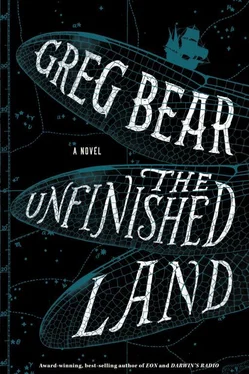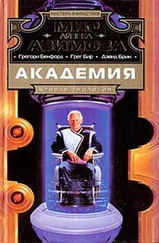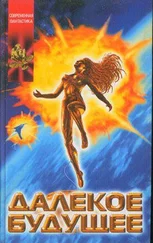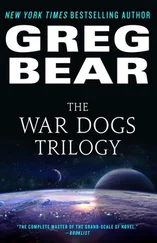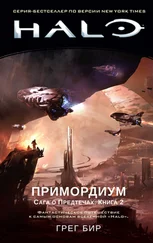Reynard stared at the barrel of salt cod. At his present level of thirst, the thick white flesh, hard as wood, was worse than useless, with no water but seawater in which to soak it. Salt from either could drive him mad.
Having been fishing and delivering freight for only three years, Reynard had not yet had time to absorb all his uncle’s sea lore, but he suspected—he felt, in a strange way—that the currents which drove the wreck were carrying him north and west. For most of a day, he passed through a slightly brackish flow, probably out of the Baltic, where shoals of herring and mackerel, along with sturgeon and fat bream and plaice, drew out English boats to compete with the Basques, the Dutch, and the French. On their first fishing expedition, his uncle had dipped a ladle in that water and offered it to his lips, to let him taste it, to remember the flavor of its source and learn how to find his way by tongue as well as eye. Now the sea was colder and saltier. That did not seem to match any currents his uncle had taught him, not for this time of year, when the North Sea warmed. Perhaps the great battle, with its flashes and cries, its explosions and whistling shot, had frightened the sea into its own madness.
By morning of what he was sure would be his last day, Reynard’s cracked skin was streaked with blood and salt, and a long gulp of seawater seemed a good, a necessary, option, if only to soften his lips and relieve his parched throat. Still, perhaps in honor of his dead uncle, he had so far resisted, knowing that he would shortly thereafter follow his shipmates to the bottom.
Reynard’s head lolled. He tried to stay awake night after night and was now losing that struggle. Even as something powerful bumped his foot, he could not open his eyes, until abruptly he heard deep thumps and great splashes. He pulled his feet up tight against his butt and blinked until he saw, across the half-submerged deck, that a long, silvery-gray shark had pushed up to get at him and was stuck—unable to thrash free and back to the sea. Now it twisted and tossed its long scimitar tail, and gaped the most frightful open-jaw threats inches from his ankles and toes, its deep-sunk eyes intent on either dining or causing the ship to break apart. Reynard was already soaked, but rolled over the gunwale aft and grabbed for a splintered rudder bar. Without thought of the danger, so close was he already to death, he braced his feet against the broken planks, leaned out over the deck, wedged the bar under the shark’s heaving middle, then hunched along on his knees and fairly lifted the great fish, teeth and dead eyes and all, back into the sea.
After crawling aft to the only dry patch that remained, he leaned back, felt his toes to make sure all remained, and continued his shivering and weary watch. The sea, gray and uniform beneath greenish-gray sky, resumed its boring mien.
Scrawny at the best of times, with a knife-cut shock of thick black hair, by looks and attitude Reynard favored his mother’s side of the family, who claimed descent from the ancient peoples who had built the great stone circles. “Stone folk,” his grandmother had called them, “and specially the men.”
His mother had taught Reynard how to notch sticks or boards in ogham, or sign secretly on his arm with his fingers, called rankalva, which she explained had been taught to humans thousands of seasons before by great Ogmios. On occasion she dropped into a speech called Tinker’s Cant, a kind of bastard Irish sometimes heard on wagons offering to do light blacksmithing, knife-honing, and scythe-sharpening—gruffly spoken by dark, black-haired peoples, women wild, men quiet and shrewd, jacks of all trades traveling horse-and-sheep-pounded pathways across Britain. His grandmother had once belonged to those folks, and his mother still proudly boasted of her girlhood, and of how women survived and even prospered in that life.
But Reynard had since his father’s death felt there would be no prosperity or fortune in fishing with his uncle. Worse, he dreaded the sea. His fear of water had brought out a cruel streak in his uncle, who did his best to shock it out of him, and nearly succeeded. Once he had tied a rope around Reynard and dragged him along behind the hoy for several miles. The fishermen had watched closely to make sure he was not drowning, and he did manage in a way to learn to swim. But what appeared to follow—acceptance and a better attitude—masked a bitter hatred, strangely not of his uncle, but of the source of all their livelihoods—the sea, that forced them into such a desperate existence. So desperately sad had he become for the brusque, brawny man who had been his father, as the years passed and his memory faded, and so anxious had he become for novelty and wider fields, and to get away from the water and the smell of fish, that at age twelve he had run away from the coast and walked west across fallow fields and over hedgerows and along farmers’ lanes until nightfall, surrounded by birdsong, light airs, and a boundless, floating sense of weary accomplishment.
On that first moonless and starless night, hunger had replaced his floating ease and cold had set in, along with guilt. He had huddled within sight of quiet shade-wrapped cows in a long wicker enclosure, observed with envy the goings-on and passing candles of a farmer’s house, and finally snuck into the low, decrepit barn and wrapped himself in dirty, unturned hay, sour and wet, trying to sleep and not succeeding, until cock’s crow and a pale sunrise.
There was nothing for it but to beg at the farmer’s door or return to the coast, back to Southwold, the boat, his uncle, and his mother. He decided against begging. On his way back, he encountered a half-drunken press gang reeling over the road near Aldeburgh, alternately singing and calling out, hoping to fill the Queen’s own ships of war. Reynard’s black hair helped him hide in the shadow of a hedgerow. “Sir Frauncis Drake’s ship,” a sailor cried in a voice sharp as a billhook, “built in this very town of Aldeburgh, demands thee! ”
Here was Reynard’s chance to flee a life of fishing and village monotony! But as much as Reynard admired Drake (and what Englishman did not?), this would still be a life at sea and not for him. He did his best to stay silent as he observed through a screen of cow parsley, grass, and hawthorn six sailors and two soldiers, swaying saps and cudgels from their broad belts, and towing two skinny, sad-looking lads bearing badges of resistance—bruises on faces and arms, ropes binding their wrists. Reynard did not wish another and stupider set of masters.
And yet now, three years later, here he was anyway, lost at sea like Oxenham’s men in his uncle’s tales. He had no idea what had happened to Drake’s ship in the engagement with the Armada, after the famed captain had captured a Spanish galleon and brought it to London to strip it of shot and gunpowder. Maybe Drake was dead or lost as well. Maybe he was alive and nearby, and soon they would meet, and the hero would rescue Reynard… What a tale that would be!
He tried to bring up some spit, but there was none to be had. Dry, rough tongue scraping cheeks brought only blood.
After the press gang had passed, Reynard had fallen asleep beneath the hedgerow, and then awakened to a strange black hand, streaked and lined with thorny white, reaching through the hawthorn to shake him. With a start, he had scrambled out of the thicket, brushing away leaves and twigs and dirt, and stood before a man who might have been older than he, or younger—hard to know, with his strange color and demeanor. Like an unholy spirit, the man had watched Reynard through eyes whose whites were black and whose pupils were a pale purple. Even in bright morning light, he appeared blacker than night, his skin blackest where touched by sun, yet brighter pale green-gray in the shadows. This bizarrely reversed fellow wore a ragged black and silver coat and breeches—and his hair hung elfin white streaked with green and blue.
Читать дальше
